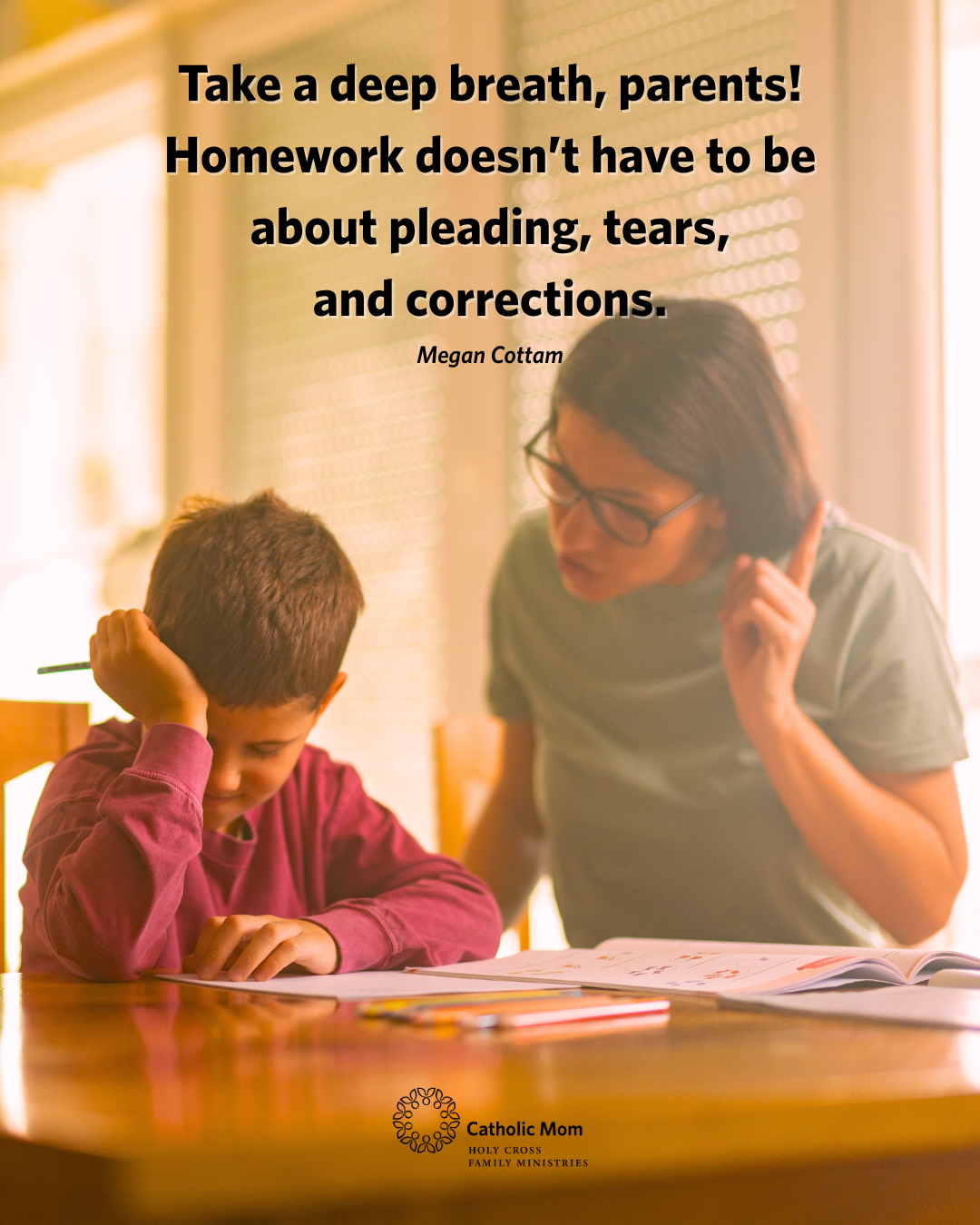
Megan Cottam shares four tried-and-true ways to bring peace and connection to homework time.
The text from my husband said it all. I was at work while he had taken on my usual role as homework supervisor, and things were not going well. “We are three problems into our math homework, and I’ve already made someone cry. What am I doing wrong?!” While I admit chuckling at his novice exasperation, I could certainly empathize.
It did not take long in our kids’ school careers to realize that the human temptation to reject help starts early. I have two wonderful, school-loving children who want to do it all coupled with a streak of perfectionism. I underestimated the conflicts that could arise over whether or not a letter was indeed facing the right direction, that 2 + 9 could equal none other than 11, or that adding that much glue would most certainly ruin the paper.

Despite these less-than-stellar family moments, we have reached a stable routine around homework that has helped me bond with my children, share stories from my own childhood, and appreciate each one’s particular gifts. Here’s what has worked for us:
Meet Physical Needs First
The first step to tear-free homework is not to do homework first! When we arrive home from the school day, I make sure there is buffer time. Often my children need to get some wiggles out, have a snack, and decompress from their day. A walk with the dog, a few minutes on their bike, and other nature-based, movement activities can go a long way in resetting their brains and preparing them for work. Alongside this is always a protein-based snack. “Hanger” is real, and it is much harder to recover from than prevent.
Multi-Task Intentionally
I had beautiful dreams of tackling my own to-do list while my children did their homework. After the 17th interrupting question for the 40th day in a row, it was time to surrender. I make sure that I am in the same room as my kids while they work. I use the time to pack lunches while they sit at the kitchen table, which does not require as much focus for when the questions, random stories, and “Oh, I forgot about this project and need supplies” commentary starts rolling in. I have found that this saves me time and frustration in the long run. I deal with any permission slips, signed paperwork, and emails from teachers at this time as well, so we are all focused on school.

Honor Gifts and Be Honest about Weaknesses
I have found that it is so incredibly important to teach my kids that they are not perfect and neither are adults. In today’s increasingly photo-shopped world, there is tremendous pressure to have it all together and soar with intelligence. Every opportunity to face our weaknesses honestly is a chance to show how God loves us and does not judge our worth as the world does. These conversations have eased the tensions of perfectionist tendencies. To balance this, when a child does something naturally, it is a great moment to provide positive feedback about their gifts during the day as well.
I have my children sort their homework, spacing out the more challenging tasks with something that comes naturally to them. For example, if there’s a difficult math worksheet, we will do the even problems, take a reading break, and then return to the odd problems. This makes the challenges seem less overwhelming and also teaches our kids to evaluate their own strengths and weaknesses.
Use the Opportunity to Share your Story
My kids often used to ask, “Mom, tell us a story from your childhood.” If you have a memory like mine, you know that it is extremely difficult to pull up stories without context. Homework helps! Do you remember doing a similar project? Have you read the same book they are reading? Do you remember giving your first oral presentation, flunking a test, or forgetting your homework? These are all important stories for your children to hear: the stories that are seemingly insignificant in the grand scheme of your life, but they are the central topics of your children’s day.
I have experienced that sharing my stories first helps validate my kids’ feelings when they are struggling and opens the door for them to share more about their day than that it was simply “fine.”

Take a deep breath, parents! Homework doesn’t have to be about pleading, tears, and corrections. It is a gift to connect with your children, watch their talents grow, and love them through their struggles. And on the hard days, know that a reset is possible each and every day. May Saint Monica, patron saint of mothers, pray for us!
Share your thoughts with the Catholic Mom community! You'll find the comment box below the author's bio and list of recommended articles.
Copyright 2025 Megan Cottam
Images: Canva
About the Author

Megan Cottam
Megan Cottam, Lay Ecclesial Minister in the Diocese of Richmond, has focused her ministry on early childhood formation (0-5), parent and family agency, and the sacramental life in the domestic church. Wife to Deacon Steven and mom to two wonderful young children, she is learning how to live out her faith at home with each daily opportunity for grace!


.png?width=1806&height=731&name=CatholicMom_hcfm_logo1_pos_871c_2728c%20(002).png)
Comments